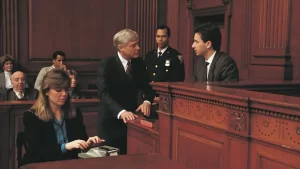 When you suffered injuries in an accident due to someone else’s negligence, your attorney will file an insurance claim against the at-fault party’s insurance company. If they won’t agree to an appropriate settlement, your attorney will file a lawsuit to get the money you need. Once your lawsuit is filed, the discovery phase of the litigation will begin. First, you and the defendant will likely serve each other with written questions and requests for documents called “Interrogatories” and “Requests for Production.” After your attorneys exchange the answers to these questions and the requested documents, defense counsel may request your deposition. Understanding what happens at a deposition can help you prepare effectively for this crucial legal procedure.
When you suffered injuries in an accident due to someone else’s negligence, your attorney will file an insurance claim against the at-fault party’s insurance company. If they won’t agree to an appropriate settlement, your attorney will file a lawsuit to get the money you need. Once your lawsuit is filed, the discovery phase of the litigation will begin. First, you and the defendant will likely serve each other with written questions and requests for documents called “Interrogatories” and “Requests for Production.” After your attorneys exchange the answers to these questions and the requested documents, defense counsel may request your deposition. Understanding what happens at a deposition can help you prepare effectively for this crucial legal procedure.
What Is a Deposition?
A deposition is a discovery tool where the attorney for the defendant can ask you questions under oath. In other words, it is your sworn testimony about the accident and your injuries. Before your deposition begins, a court reporter will swear you in. The court reporter will record all spoken words from you and the defense attorney, creating a deposition transcript usable in court if your case goes to trial.
In contrast to written discovery, a deposition is oral discovery in which the other party’s attorney can ask you questions and evaluate how you would perform as a witness if the case were to proceed to trial.
The defendant’s attorney will issue a Notice of Deposition and Subpoena to compel your attendance at a deposition. Your deposition will likely occur at an attorney’s office in a conference room.
Before your deposition, you can meet with your lawyer to prepare. To prepare yourself, it’s important to understand what happens at a deposition. Although your attorney is prohibited from “coaching” you and suggesting your answers to anticipated questions during the deposition, they will prepare you by reviewing your Interrogatory Answers and conducting some role-play by asking you questions they expect the defendant’s lawyer to ask you.
What Types of Questions Are Asked During a Deposition?
 Nearly any question is fair game, and you can expect the attorney to ask you questions concerning:
Nearly any question is fair game, and you can expect the attorney to ask you questions concerning:
- Your background – Defense counsel will ask questions about where you live, your family, your educational background, and what you do for work.
- Your health history – Since you claim injuries from the accident, your prior health history becomes relevant and open for discussion. Opposing counsel will likely inquire about your medical history, including any prior injuries or surgeries and whether you take any medication.
- The accident – You can expect many questions concerning the accident itself, including how it happened, what you observed, who you spoke to at the accident scene, and what, if anything, you discussed with the defendant.
- Your injuries – The defendant’s attorney will question you about your injuries, medical treatments, ongoing care, recovery prospects, and medical costs if you sustained injuries and financial losses in the accident. If your financial losses include lost wages or property damage, the attorney will ask you about the extent of these losses.
- The accident’s impact on your life – Depending on the allegations in your Complaint, the defendant’s attorney may ask you how your life is different now than before the accident. They will ask about the physical, mental, and emotional toll the accident has had on you and your loved ones.
Although the defendant’s attorney will ask the bulk of the questions during the deposition, your attorney may have some follow-up questions for you after the defense attorney’s initial line of questioning.
How Does a Deposition Affect My Case?
Your deposition testimony can significantly impact whether your case goes to trial. Often, defense counsel will make a settlement offer after a deposition once they learn more about the strengths of your case and how well you present as a witness. If informal negotiations don’t settle the case, the defense attorney may request mediation before going to trial. Knowing what happens at a deposition can provide valuable context for these subsequent steps. As you can see, a deposition is an important opportunity to tell your side of the story, explain how the accident changed your life, and demonstrate your credibility as a witness.
Contact a Personal Injury Lawyer Today
If you were injured in an accident in Chicago, you need a personal injury lawyer from Karlin, Fleisher & Falkenberg, LLC. We have been representing injured people in Chicago since 1970. We have the experience, track record, and reputation you can trust. Our team works hard to pursue the compensation you deserve so that you can move on with your life after a traumatic accident. Call us today at 312-346-8620 or use our online chat feature anytime.
Related Reading:
